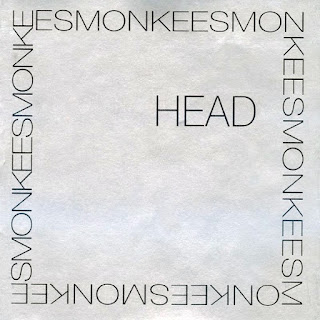The Monkees: Head OST (Rhino)
Purchased used at Vinyl Remains
Superbowl, Superbowl, Superbowl. The closest I come to caring is that I'd rather see Philadelphia win than Kansas City, for no particularly good reason. That's about as much passion I can muster. I like to say that my general distaste for American football originates with having watched five seasons of my high school's generally bad team from the band bleachers. To be fair to them, they played teams from generally much larger schools. And to be fair to myself, I probably wouldn't care too much about football anyway.
So, put on a record, blog some thoughts, possibly finish the Dune book I'm reading (#3). Looking for something to put on, I was unsure if I had listened to this one completely.
I think it was Michael Weldon (Psychotronic Encyclopedia of Film) suggested watching Head to see The Monkees perform "careericide." I suppose the plotless, trippy feature would endear them to a certain audience in the long run, but this wasn't the cute quasi-sitcom from network TV that I'm sure many expected at the time.
I've seen I think two of those made for TV documentaries about The Monkees. The creation of impresario Don Kirshner, he specifically wanted a 100% image band that he could control completely. So what happens when the band rebels and decides to go their own path? What happens when a manufactured band becomes a real band?
I'm naturally inclined to side with them over Kirshner, but as with most things in life, the truth is a little more nuanced. They did sign up to be part of a television program playing a fictitious rock band. The instigator is acknowledged to be Mike Nesmith, who was starting to establish himself as songwriter outside of The Monkees. He'd later pen The Stone Poneys hit "Different Drum". In one of the docs, Don said he rued the day he met Mike Nesmith.
But you know, what did he expect? They were talented singers (mostly), it was an era of questioning authority, it comes as little surprise that they'd want to be treated like adults and artists. Kirshner would later score a 100% image band by co-creating The Archies.
What of the music, this record? It starts strangely enough with a musique concrète edit of clips from the film, not the way to start a pop album in the least. Even The Beatles put "Revolution #9" in the middle of the album. Of the six proper songs on the album, two were written by Peter Tork, one Mike Nesmith. Tork's "Do I Have To Do This All Over Again" is a fairly strong 60s rocker, as is Nesmith's "Circle Sky". "Daddy's Song", written by Harry Nilsson, is an okay song but always kind of struck me as a take on Paul McCartney's "Your Mother Should Know" from Magical Mystery Tour.
I find the standout is the opening/closing song for the film, "Porpoise Song" cowritten by Carole King. There's a demo recording of her singing the song, probably on Youtube somewhere. It's slow and dreamy, interesting chord progression, with an orchestral arrangement that again recalls what George Martin did with The Beatles. In this case I don't consider it a knock, I like the orchestration.
I guess the question with The Monkees, or any music for that matter, is: if you like it, does the source matter? It's easy to look down on their early recordings as prefab, but some of the songs are quite good. They had excellent songwriters working for the show. Ironically, in this age of the mega pop star, those vocalists all seem manufactured to me. I don't know one voice from another, and the vocals are so thoroughly processed that I don't think it matters. The songwriting is often by committee. It's as though they're trying to be a package the way that The Monkees were intended to be, whereas The Monkees strived to break out of that box.

No comments:
Post a Comment